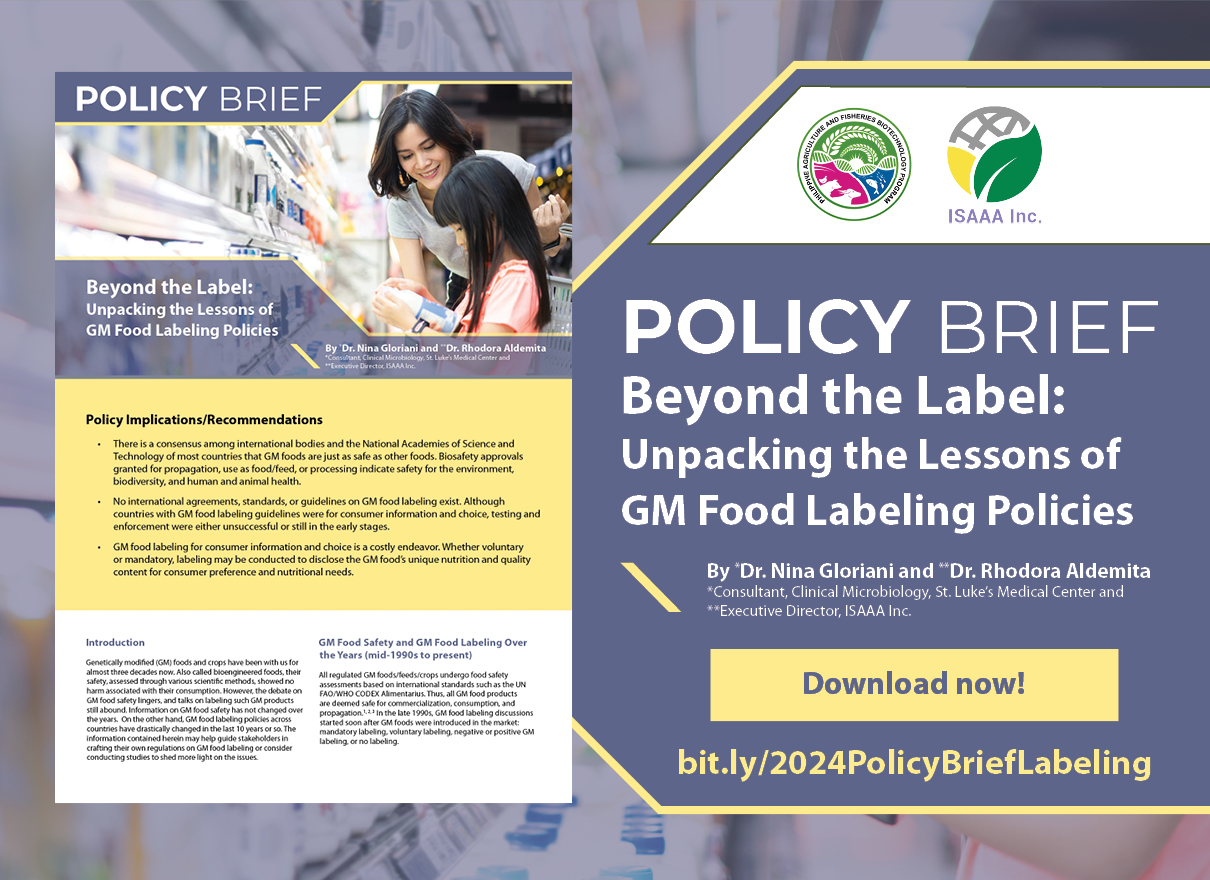ISAAA and DA Biotech Release Policy Brief on GM Food Safety and Food Labeling
| |
ISAAA Inc., in partnership with the Philippine Agriculture and Fisheries Biotechnology Program (DA Biotech), published a policy brief titled Beyond the Label: Unpacking the Lessons of GM Food Labeling Policies. The policy brief is authored by Dr. Nina Gloriani, a Clinical Microbiology Consultant at St. Luke's Medical Center, and ISAAA Executive Director, Dr. Rhodora Romero-Aldemita.

In an era where food products and choices are extremely scrutinized, the debate over genetically modified (GM) foods remains contentious. Central to these discussions is the issue of labeling foods derived from GM technology, an issue that has stirred controversy over GM foods. The call for labeling of GM foods stems from concerns about food safety and consumer choice. Advocates argue that consumers have the right to know what they are eating and make informed decisions about their food purchases. While transparency is indeed crucial, the labeling of GM foods often perpetuates misconceptions and unjustly stigmatizes these products.
The policy brief titled, Beyond the Label: Unpacking the Lessons of GM Food Labeling Policies, presents the advantages and disadvantages of labeling food derived from biotechnology in the context of food safety. Experiences of other countries in implementing/not implementing labeling laws are also highlighted as case studies in this brief.
Global Perspectives on GM Food Safety and Food Labeling
During the late 1990s, GM food labeling stirred discussions after GM foods were introduced in the market. Conversations revolved around mandatory labeling, voluntary labeling, negative or positive GM labeling, or no labeling. Eventually, more countries adopted GM food labeling policies in the 2000s.
In 2016, Public Law 114-216, named the “National Bioengineered Food Disclosure Standard,” established standards for labeling GM foods, but it was only in January 2022 that the USA started complying with the law. The law indicates that labeling GM foods shall not imply safety or nutrition concerns, but simply inform consumers of the ingredients. In China, all GM imports are required to have labeling and safety certifications managed and overseen by various government agencies in 2002. Meanwhile, Thailand requires genetically modified organisms (GMO) labeling for packaged food products that contain GMO ingredients equal to or >5% of the total weight. In the Philippines, on the other hand, none of the bills on mandatory labeling of GM food have been passed into law to be implemented. Thus, GM food labeling in the country remains to be voluntary.
According to a review, these labeling regulations were not successful in providing consumer choice or consumer information. In the Philippines, a study reported that mandatory labeling would result in an approximately 12% increase in production costs, which translates to an estimated 10% increase in consumer price.
Controversies concerning GM foods have persisted in the background of these regulations over the years. In the USA, concerns are more focused on human and animal health and the environment. In China, people believe that GMOs are a form of bioterrorism, an intentional release of microorganisms that are lethal to humans. However, there are countries that have expressed their interest and willingness to adopt the technology in their country. In fact, the Republic of South Africa believes that biotechnology is a powerful tool for increasing crop productivity and addressing food insecurity.
In light of these considerations, the brief provided the following policy recommendations:
- There is a consensus among international bodies and the National Academies of Science and Technology of most countries that GM foods are just as safe as other foods. Biosafety approvals granted for propagation, use as food/feed, or processing indicate safety for the environment, biodiversity, and human and animal health.
- No international agreements, standards, or guidelines on GM food labeling exist. Although countries with GM food labeling guidelines were for consumer information and choice, testing and enforcement were unsuccessful.
- GM food labeling for consumer information and choice is a costly endeavor. Whether voluntary or mandatory, labeling may be conducted to disclose the GM food’s unique nutrition and quality content for consumer preference and nutritional needs.
The policy brief on GM Food Safety and Food Labeling is an addition to the Know the Science Policy Briefs intended for distribution to the committees in the House of Representatives. This series intends to promote a favorable regulatory environment for the commercialization of biotech products.
Download the policy brief to learn more about GM Food Safety and Food Labeling. Read the following briefs to know more:
- We Can Be Friends: Harvesting the Benefits of Coexistence Farming
- Accelerating Impact Through a Responsive Regulatory Framework: the DOST-DA-DENR-DOH-DILG Joint Department Circular No. 1, Series of 2021
- To Regulate, or Not to Regulate, the Answer to the Question: The NCBP Policy on Plant Breeding Innovations or New Breeding Techniques
- Modern Animal Biotechnology: Benefits, Future Directions, and Policy Recommendations
| Newer Post | Archive | Older Post |
Science Speaks is ISAAA Inc.'s official blog. Weekly blog articles, authored by ISAAA writers, partners, and invited contributors, aim to help share, disseminate, and promote scientific knowledge and its vital role in achieving global agricultural sustainability and development. Your support to Science Speaks will help us achieve this goal. You can help us by donating as little as $10.

